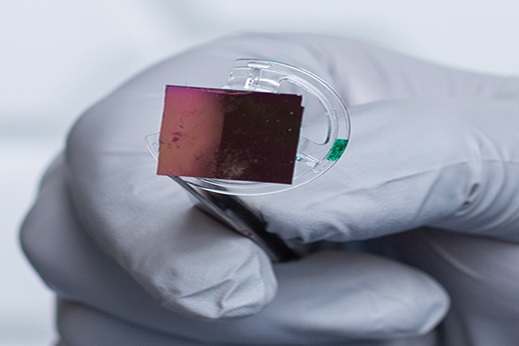Silicon Nanochip that can Reprogram Development of your Body Cells
A silicon device that can change skin tissue into blood vessels and nerve cells has advanced from prototype to standardized fabrication, meaning it can now be made in a consistent, reproducible way. As reported in Nature Protocols, this work, developed by researchers at the Indiana University School of Medicine, takes the device one step closer to potential use as a treatment for people with a variety of health concerns.[1]

Figure 1. Silicon Nanochip that can Reprogram Development of your Body Cells
Figure 1 shows the technology, called tissue nanotransfection, is a non-invasive nanochip device that can reprogram tissue function by applying a harmless electric spark to deliver specific genes in a fraction of a second. In laboratory studies, the device successfully converted skin tissue into blood vessels to repair a badly injured leg. The technology is currently being used to reprogram tissue for different kinds of therapies, such as repairing brain damage caused by stroke or preventing and reversing nerve damage caused by diabetes. [2]
Propelled by a focused electric charge, these genes are introduced to the desired depth in the living tissue and alter the cells, converting the location into a little bioreactor that reprograms the cells to become different kinds of cells or multicellular structures, such as blood vessels or nerves, without the need for elaborate laboratory techniques or hazardous virus transfer systems. Once produced, these cells and tissues can help to repair damage both locally or in other parts of the body, including in the brain.
"This small silicon chip enables nanotechnology that can change the function of living body parts," says Sen, director of the Indiana Center for Regenerative Medicine and Engineering.
"For example, if someone's blood vessels were damaged because of a traffic accident and they need blood supply, we can't rely on the pre-existing blood vessel anymore because that is crushed, but we can convert the skin tissue into blood vessels and rescue the limb at risk."
The technology has been under development for over five years, and the IU team is now focusing on going beyond prototyping to making the nanochip a practical concern that can be used in clinical settings. This includes securing US FDA approval next year, which would open up the potential for clinical research in people. Potential applications in civilian and military medicine include repairing brain damage resulting from a stroke or reversing nerve damage caused by diabetes.
"This is about the engineering and manufacturing of the chip," says Sen. "The chip's nanofabrication process typically takes five to six days and, with the help of this report, can be achieved by anyone skilled in the art." [3]
References:
- https://www.healthcareradius.in/features/technology/innovative-silicon-nanochip-can-reprogram-biological-tissue-in-living-body
- https://techilive.in/innovative-silicon-nanochip-can-reprogram-biological-tissue-in-living-body/
- https://newatlas.com/medical/silicon-nanochip-reprogram-skin-cells-in-body-blood-vessels/
Cite this article:
Thanusri swetha J (2022), Silicon Nanochip that can Reprogram Development of your Body Cells, pp. 62

